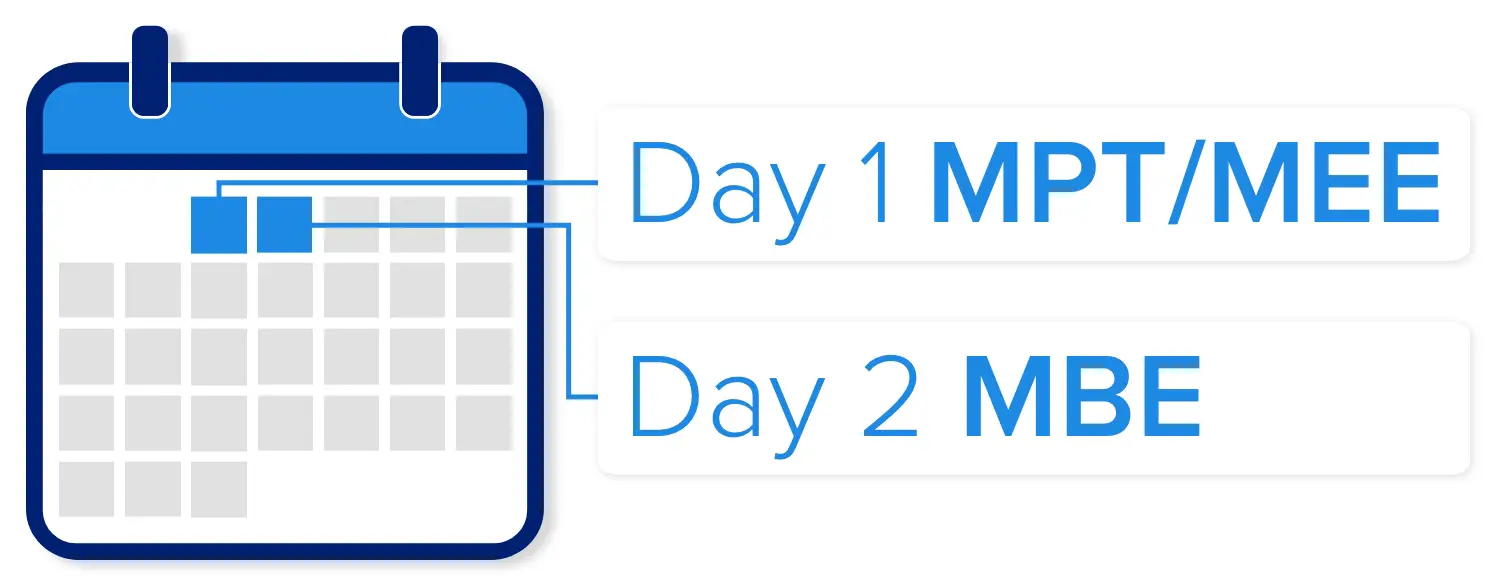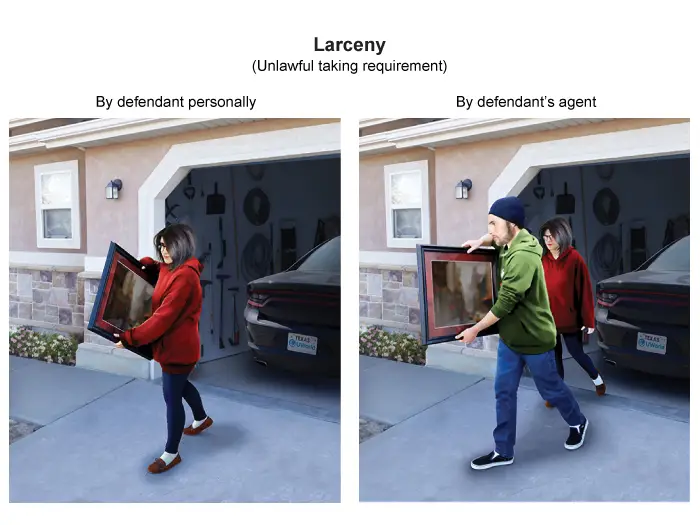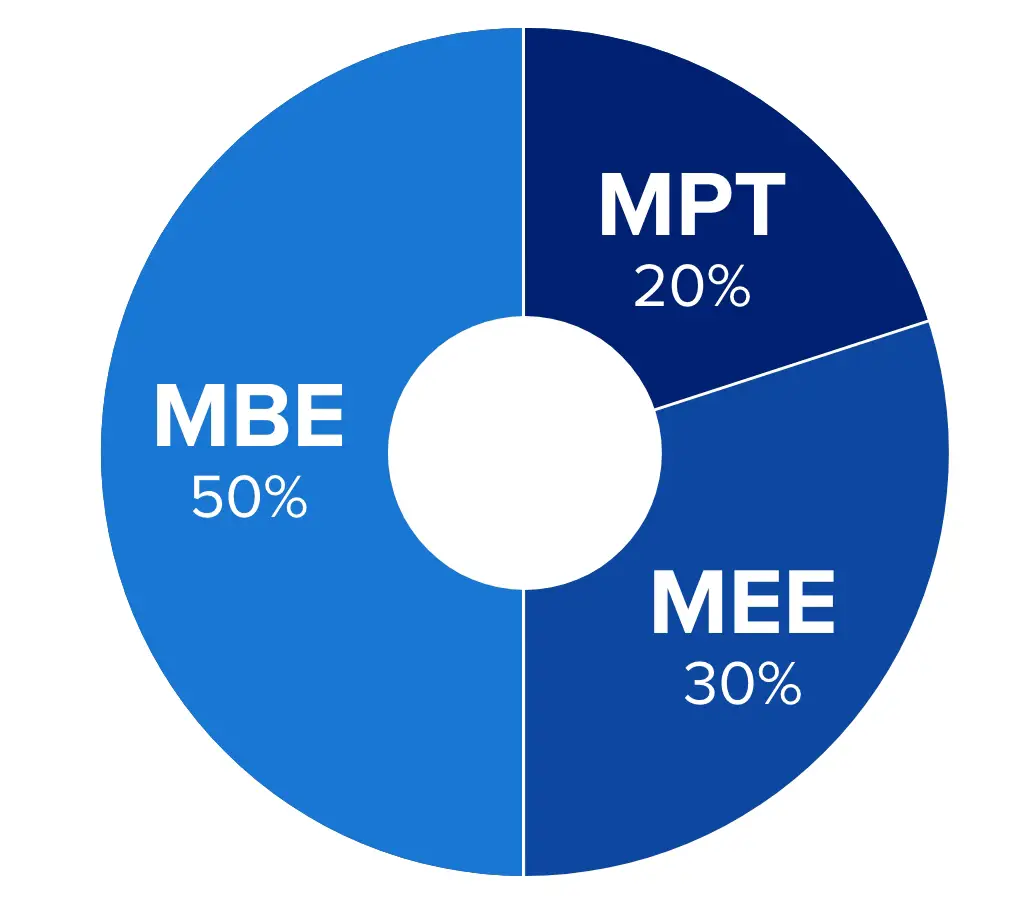
The Minnesota Bar Exam adopted the Uniform Bar Examination (UBE®) in February 2014. The UBE is divided into three sections—the Multistate Bar Examination (MBE®), the Multistate Performance Test (MPT®), and the Multistate Essay Examination (MEE®). The exam has been designed to assess a candidate's understanding of a wide range of legal topics and the ability to apply that knowledge in various situations.
The UBE is standardized and portable, meaning successful examinees can transfer their scores to one or more of the 41 participating jurisdictions. If you're preparing to take the MN Bar Exam, this article provides everything you need regarding results, requirements, dates, deadlines, fees, applications, and more.
The Uniform Bar Examination is administered over two days and consists of a writing section (MPT/MEE) and a multiple-choice section (MBE).

The MBE is weighted at 50% of the UBE, making it the most heavily weighted section of the Minnesota Bar Exam. Examinees will have two 3-hour sessions to answer 200 multiple-choice questions.
The MEE is weighted at 30% of the UBE and is administered on day one. Examinees have 3 hours to answer six 30-minute essay questions.
The MPT is weighted at 20% of the UBE and is administered on day one. Examinees are provided with faux case files imitating realistic scenarios and a folder with various legal documents, which they must use to respond to assignments.
Master legal rules easier with in-depth answer explanations that include illustrations and charts visuals.

Submitting your application for the Minnesota Bar Exam before the initial filing deadline will save you from paying a $200 late filing fee. For details, refer to the critical dates, deadlines, and fees listed below.
As of June 3, 2022, paper applications will no longer be accepted. All Minnesota Bar Exam applications must be submitted online by the late filing deadline. The Board waives late fees for repeat takers. See the deadlines for the July and February 2024 exams below.
| Filing Periods | February 28-29 2024 | July 30-31, 2024 | Fee |
|---|---|---|---|
| Timely Filing Deadline | October 16, 2023 | March 15 | $600 |
| Late Filing Deadline | December 1, 2023 | May 1 | $800 |
You must have a Juris Doctorate degree (JD) or LLB that is provisionally or fully approved by the American Bar Association (ABA) to sit for the Minnesota Bar Exam. These requirements may be waived if you meet one of the criteria below.
Any applicant, including foreigners, can sit for the MN Bar Exam if they have been licensed for over ten years in any US jurisdiction. Otherwise, they must meet the following criteria:
At the Board’s discretion, foreign lawyers may practice law in Minnesota as a Foreign Legal Consultant without taking the bar exam. However, they must maintain an office in Minnesota for the purpose of practicing law as a Foreign Legal Consultant and have been engaged in the active practice of law in a foreign country for at least five of the seven years preceding their application.
To schedule your appointment to sit for the Minnesota Bar Exam, you must create an account with the Minnesota State Board of Law Examiners. You will be prompted to fill out an eligibility questionnaire before you can login and create your account. You will be asked to pay fees upon submission of your application. If you have any issues, the Board has created a series of "how to" videos for the application process. Repeaters can create an account without taking the questionnaire.

Themis courses include unlimited essays for practice, simulation, and a dedicated attorney essay grader.
Fees and costs associated with registering for the Minnesota Bar Exam vary depending on the examinee's status (first-time taker, repeat taker, attorney, etc.) and the date they file. Below is a detailed and up-to-date list of exam-related fees.
| Application Fees | |||
| First Time Applicant | $600 | ||
| Repeater | $600 | ||
| Attorneys | $1,050 | ||
| Late Fees | |||
| First Time Applicant | $800 | ||
| Repeater | $600 | ||
| Admission without Examination | $1150 | ||
| Admission by House Counsel | $1150 | ||
| Admission by Temp. House Counsel | $700 | ||
| Other Application Fees | |||
| Foreign Legal Consultant | $1,200 | ||
| Admission on Motion Fee | $1,150 | ||
| Miscellaneous Fees | |||
| Laptop Use Fee | $100 | ||
| Copies of Exam Answers | $20 | ||
The Board accepts payments through your online application portal via Visa, Discover, MasterCard, American Express, and ACH payments. Payments are processed through US Bank's secure payment site. Partial refunds are given to applicants that withdraw their applications fifteen or more days before the examination—$150 to those who paid a $600 fee and $300 to those who paid a $1,050 fee.
If you are unable to take the exam due to a medical emergency, a death in the family, or similar exceptional circumstances, you can request to have your fee carried over to the next exam administration. Carry-over requests must be submitted in writing with documentation of the emergency no later than 14 days following the exam for which you applied. If granted, you must reapply for the next exam and pay a $50 fee.
The application process for taking the Minnesota Bar Exam isn't cheap. Fortunately, there are cost-saving options available for eligible candidates. For example, the Ramsey County Bar Association and the Hennepin County Bar Foundation award various scholarship funds to Minnesota law school students who are members of traditionally under-represented or marginalized groups who contribute meaningfully to their community. For individuals just starting their legal education, The University of Minnesota also offers scholarships ranging from $5,000 to full tuition based on admission applications that are awarded at the time of admission.
If you don't qualify for the above cost-saving options, you can browse the AccessLex Institute Law School Scholarship Databank for cost-saving options suited to you. Furthermore, the ABA offers 100+ opportunities and programs for young lawyers and law students annually. There are also some simple actions you can take to save money as you work toward bar admission:

The MN Bar Exam tests an examinee's ability to analyze and reason alongside their knowledge and understanding of fundamental legal principles. Furthermore, since Minnesota has adopted the UBE, a successful exam score represents one's competency and readiness to practice law in the 40 other participating jurisdictions.
The MEE consists of six 30-minute essay questions. Each question involves one or more of the subjects listed below. Some subjects may be paired together. Other subjects could be omitted. While it's impossible to know which subjects the National Conference of Bar Examiners (NCBE®) will choose on any given exam version, some have been tested more frequently than others historically.
For example, Civil Procedure has appeared on nearly every MEE in the past decade, while Criminal Law has only appeared several times. However, subjects that occur less frequently on their own may be paired with others. Our MEE Study Guide and Prep Tips provide all the details you need to focus your studies on what's essential and use your time efficiently.
Check out our MEE Subject Matter Outline for detailed explanations of MEE subjects and sub-topics.
The MBE is administered in two 3-hour sessions on (Day 2) of the bar exam on the last Wednesday in February and July. It is scored on a 200-point scale and presents candidates with 200 multiple-choice questions spanning the following MBE subjects, broken down into 25 questions per subject:
The MPT consists of closed-universe practical questions with instructions, factual data, cases, statutes, and other reference material supplied by examiners. Candidates will answer two cases presenting simulated real-life scenarios occurring in the fictional jurisdiction of "Franklin." These tasks are designed for examinees to demonstrate their lawyering skills, using only the materials provided by the bar examiners. Each case is assessed on a 6-point scale, with a 6 being the highest possible score and a 0 being the lowest possible score.
To be admitted into the Minnesota Bar, applicants must pass the UBE with a minimum scaled score of 260 out of 400. Exam weightage is divided between the three sections as follows:

The MEE and MPT are combined into half the weightage of the test and graded as such. Therefore, the writing section (MEE/MPT) and the multiple-choice section (MBE) each comprise 50%, or 200 points, of your total scaled score. If you do poorly on one section of the exam, you can make up for it on the other, as long as these scores combine to a sum of 260 or more.
Note that getting 130 of 200 MPT questions correct does not necessarily mean you've earned 130 scaled points. Scaled scoring is a method used to ensure that everyone's exam is judged fairly. Imagine that you and a friend take the bar exam during different administrations, and your exam turns out to be more difficult. It would be unfair to allow someone to pass or fail based on the relative difficulty of their exam version. Therefore, examinees' raw scores are calculated into scaled scores. Unfortunately, the NCBE does not release data on the calculations it uses to determine scaled scores.
Before you can practice law in Minnesota, you must pass the Multistate Professional Responsibility Examination (MPRE®) with a minimum score of 85. The MPRE features 60 multiple-choice questions administered over two hours. Check out our article, About the MPRE, to learn more about the mandatory exam.
As is common with bar exams across the United States, the Minnesota Bar Exam's pass rate for repeaters is considerably lower than for those taking it for the first time. This is likely because many repeat takers don't substantially modify their study habits.
| Exam | Overall Pass Rate | First-Timer Pass Rate | Repeater Pass Rate | Results Release Date |
|---|---|---|---|---|
| July 2023 | 79% | 86% | 37% | October 2 |
| Feb. 2023 | 45% | 62% | 29% | April 17 |
Below are the annual pass rates for the Minnesota Bar Exam since 2017 divided into first-time examinees and repeaters: